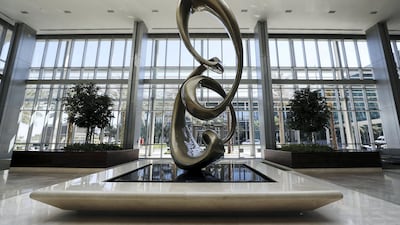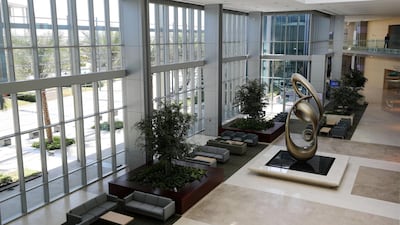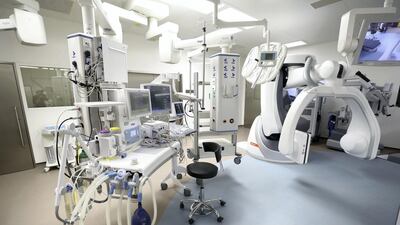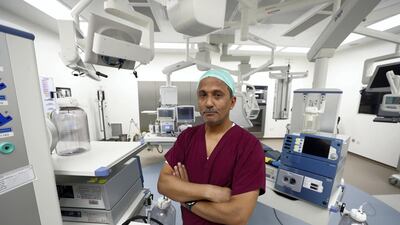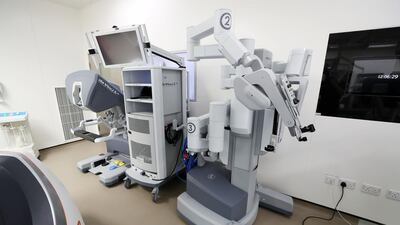A leading oncologist has urged the public to be aware of the symptoms of blood cancer and leukaemia amid a global rise in new cases.
Dr Shahrukh Hashmi, chair of the haematology and oncology department at Abu Dhabi's Sheikh Shakhbout Medical City, said too many cases were diagnosed in the advanced stage.
Leukaemia is a group of blood cancers that usually develop in the bone marrow and the lymphatic system.
It is among the 10 most prevalent cancers globally and according to studies has been on the rise in recent years. The five-year survival rate in the United States is about 57 per cent.
“We have hundreds of cases recorded every year but it is very likely that there are even more that go unrecorded, because many go underdiagnosed or misdiagnosed," said Dr Hashmi, a specialist in late-stage chemotherapy treatment and cancer survivability.
Less is known about the causes of leukaemia and lymphoma than many other cancers. Exposure to certain chemicals, genetic disorders, family history and smoking are known to be factors.
Some studies have linked blood cancers to a rise in pollution.
Dr Hashmi believes more research is needed in the Gulf and UAE to understand the causes.
He said environmental factors could play a part, along with "inheritable cancers due to consanguineous marriages".
“We have not yet had any epidemiological studies giving the exact cause of the significantly higher ratio of blood cancers to solid cancers in the UAE," he said.
_______________________
Leukaemia symptoms
- fever or chills
- persistent fatigue, weakness
- frequent or severe infections
- losing weight without trying
- swollen lymph nodes, enlarged liver or spleen
- excessive sweating, especially at night
Source: Mayo Clinic
_______________________
Dr Hashmi said too many patients shuttle between smaller hospitals and undergo a myriad of referrals before they reach a specialist cancer ward.
“The biggest problem I see here is the dissipation of care. Many patients will go to several hospitals before finally landing at tertiary care centres like SSMC," he said.
“By the time they come here they already have been to three or even four hospitals which delays care.”
Last month, a study shed light on the high prevalence of cancer in UAE and Saudi Arabia.
The analysis of 2017 data from major developed countries showed almost half of all cancer cases in the UAE involved people aged under 50.
The study’s authors, from University of Sharjah's College of Medicine, said the trend was a "critical issue that is currently underreported".
As with global trends, breast cancer was most prevalent – accounting for 36 per cent of all cases – followed by several forms of colorectal cancers.
The latter in particular is closely linked to lifestyle choices, including bad diet, smoking and drinking alcohol.
Dr Hashmi said better lifestyles, high public awareness and regular screening of people of all ages will save lives.
"The one thing that the public can take charge of when it comes to cancer is active surveillance," he said.
"People should get regular screenings for cancers such as pap smears, colonoscopies and mammograms. These are preventative measures that have been around for decades in Europe and the US.
"Our screening rates are low and we are really hoping it can go up, especially for the most common cancer we know of, breast cancer.”
For blood cancers, some of the common symptoms are fatigue and persistent swollen lymph nodes.
Acute leukaemia patients will generally need a bone marrow or stem cell transplant.
Despite advances in the UAE's organ transplant programme, including the first bone marrow transplant in 2020, many patients travel abroad for treatment.
Sheikh Shakhbout Medical City will have its own transplant centre set up by the final three months of 2021.
For patients such as 34-year-old Mohammad Hoda, an electrician who works for a company in Abu Dhabi, it cannot open too soon.
He is undergoing chemotherapy at SSMC and his doctors are working with hospitals in India to try to find a suitable donor for a bone marrow transplant.
The Indian father-of-four was found with advanced leukaemia just over a month ago.
"I was feeling very tired and had severe pain in my body. I also had a few nose bleeds," he said.
When The National visited his hospital room last week, he was hopeful that medics in India will find a match, giving a thumbs up as he posed for a photograph.
But like all organ transplant patients, has no way of knowing if – and how long – it could take to find a donor.
"It is hard that I am alone here without my family, and my future is uncertain," he said.



